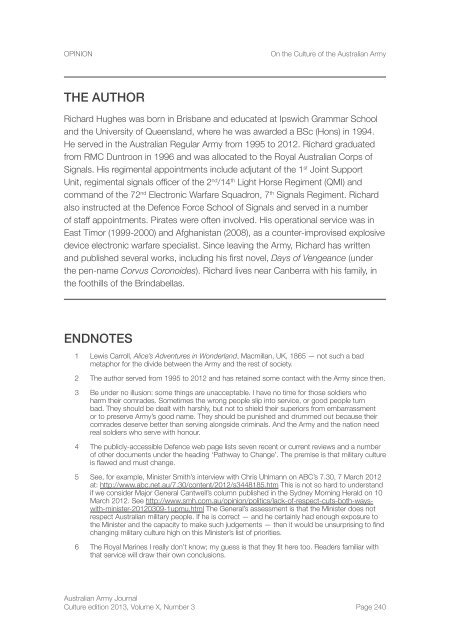Australian Army Journal
Australian Army Journal
Australian Army Journal
Create successful ePaper yourself
Turn your PDF publications into a flip-book with our unique Google optimized e-Paper software.
OPINION<br />
On the Culture of the <strong>Australian</strong> <strong>Army</strong><br />
THE AUTHOR<br />
Richard Hughes was born in Brisbane and educated at Ipswich Grammar School<br />
and the University of Queensland, where he was awarded a BSc (Hons) in 1994.<br />
He served in the <strong>Australian</strong> Regular <strong>Army</strong> from 1995 to 2012. Richard graduated<br />
from RMC Duntroon in 1996 and was allocated to the Royal <strong>Australian</strong> Corps of<br />
Signals. His regimental appointments include adjutant of the 1 st Joint Support<br />
Unit, regimental signals officer of the 2 nd /14 th Light Horse Regiment (QMI) and<br />
command of the 72 nd Electronic Warfare Squadron, 7 th Signals Regiment. Richard<br />
also instructed at the Defence Force School of Signals and served in a number<br />
of staff appointments. Pirates were often involved. His operational service was in<br />
East Timor (1999-2000) and Afghanistan (2008), as a counter-improvised explosive<br />
device electronic warfare specialist. Since leaving the <strong>Army</strong>, Richard has written<br />
and published several works, including his first novel, Days of Vengeance (under<br />
the pen-name Corvus Coronoides). Richard lives near Canberra with his family, in<br />
the foothills of the Brindabellas.<br />
ENDNOTES<br />
1 Lewis Carroll, Alice’s Adventures in Wonderland, Macmillan, UK, 1865 — not such a bad<br />
metaphor for the divide between the <strong>Army</strong> and the rest of society.<br />
2 The author served from 1995 to 2012 and has retained some contact with the <strong>Army</strong> since then.<br />
3 Be under no illusion: some things are unacceptable. I have no time for those soldiers who<br />
harm their comrades. Sometimes the wrong people slip into service, or good people turn<br />
bad. They should be dealt with harshly, but not to shield their superiors from embarrassment<br />
or to preserve <strong>Army</strong>’s good name. They should be punished and drummed out because their<br />
comrades deserve better than serving alongside criminals. And the <strong>Army</strong> and the nation need<br />
real soldiers who serve with honour.<br />
4 The publicly-accessible Defence web page lists seven recent or current reviews and a number<br />
of other documents under the heading ‘Pathway to Change’. The premise is that military culture<br />
is flawed and must change.<br />
5 See, for example, Minister Smith’s interview with Chris Uhlmann on ABC’s 7.30, 7 March 2012<br />
at: http://www.abc.net.au/7.30/content/2012/s3448185.htm This is not so hard to understand<br />
if we consider Major General Cantwell’s column published in the Sydney Morning Herald on 10<br />
March 2012. See http://www.smh.com.au/opinion/politics/lack-of-respect-cuts-both-wayswith-minister-20120309-1upmu.html<br />
The General’s assessment is that the Minister does not<br />
respect <strong>Australian</strong> military people. If he is correct — and he certainly had enough exposure to<br />
the Minister and the capacity to make such judgements — then it would be unsurprising to find<br />
changing military culture high on this Minister’s list of priorities.<br />
6 The Royal Marines I really don’t know; my guess is that they fit here too. Readers familiar with<br />
that service will draw their own conclusions.<br />
<strong>Australian</strong> <strong>Army</strong> <strong>Journal</strong><br />
Culture edition 2013, Volume X, Number 3 Page 240

















